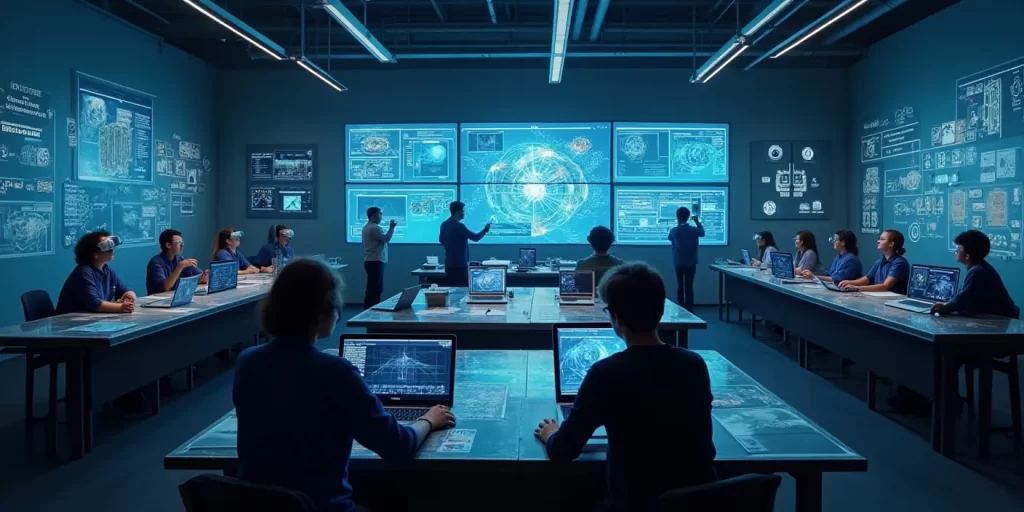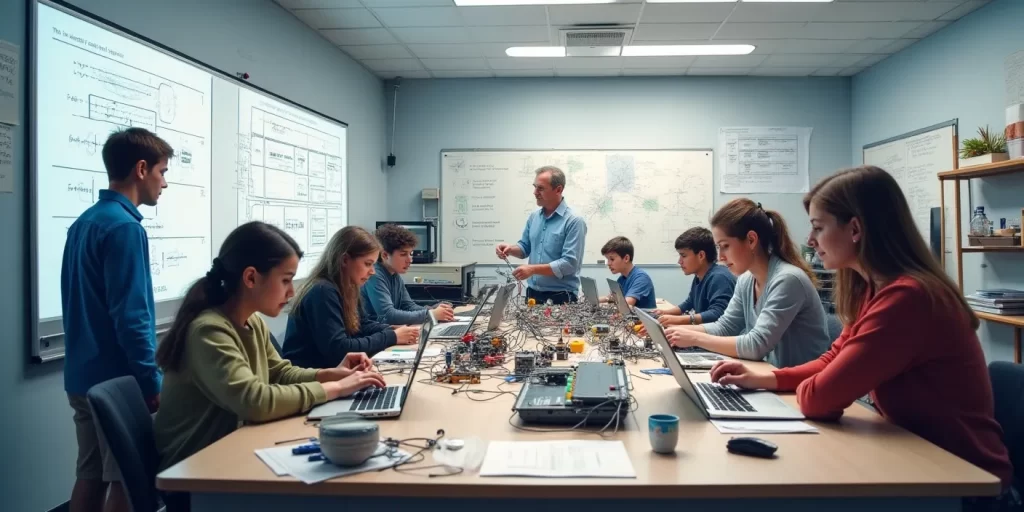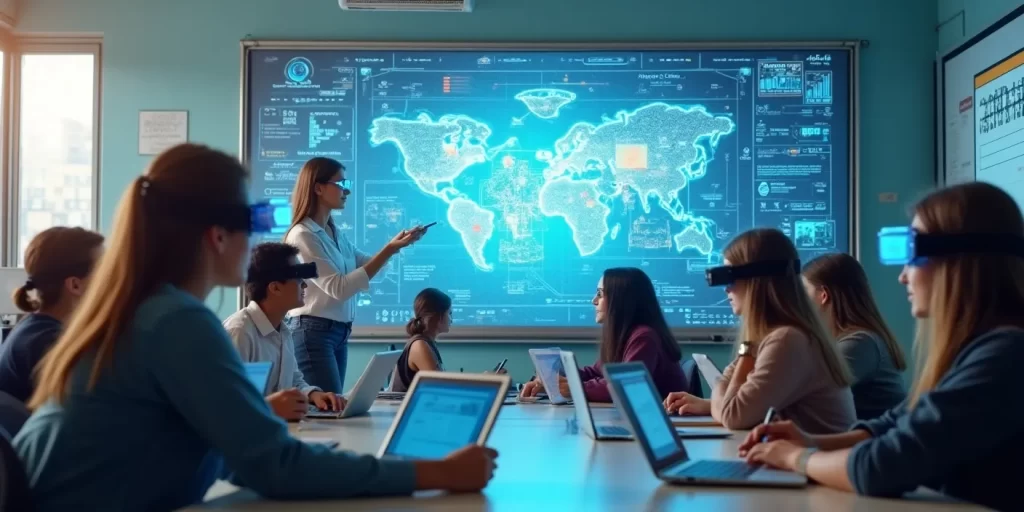The Impact of Digital Transformation on Engineering Education
Digital transformation is no longer a futuristic idea; it is a present-day necessity, especially in academia. The impact of digital transformation on engineering education has become increasingly vital in shaping skilled, future-ready engineers. At M.Kumarasamy College of Engineering (MKCE), the impact of digital transformation on engineering education is reflected in every classroom, lab, and collaborative space. From advanced learning management systems to AI-powered labs and cloud-based tools, the impact of digital transformation on engineering education is setting new standards. Understanding the impact of digital transformation on engineering education is critical for students, educators, and institutions aiming to stay competitive in the global landscape.
At MKCE, the impact of digital transformation on engineering education has been evident in curriculum delivery, practical learning, assessment methods, and student engagement. Recognizing the impact of digital transformation on engineering education is essential for those who aspire to become future-ready engineers. As digital technology redefines every industrial and professional domain, the impact of digital transformation on engineering education also ensures that graduates from MKCE are prepared to meet the demands of Industry 4.0.
Let’s explore how MKCE leverages the impact of digital transformation on engineering education to foster innovation, practical skills, and global competencies.

Understanding the Impact of Digital Transformation on Engineering Education
Why the Impact of Digital Transformation on Engineering Education Matters Today
The impact of digital transformation on engineering education is redefining traditional classroom methodologies. With tools such as smart boards, simulation software, and virtual labs, MKCE ensures students gain hands-on exposure to real-world challenges even before entering the workforce. The impact of digital transformation on engineering education allows for an adaptive learning environment where students can learn at their own pace, access cloud-based assignments, and receive personalized feedback from faculty.
Smart Classrooms and the Impact of Digital Transformation on Engineering Education at MKCE
Interactive Learning through Smart Technology
MKCE has embraced smart classroom technology as part of the impact of digital transformation on engineering education. Students engage with subjects through multimedia, online assessments, and augmented reality tools, transforming theoretical concepts into interactive experiences. These digital tools provide continuous access to global learning resources, reinforcing the impact of digital transformation on engineering education at the institutional level.
Online Labs and Practical Learning – A Major Impact of Digital Transformation on Engineering Education
Bridging the Gap Between Theory and Practice
Through virtual labs and simulations, MKCE empowers students with real-time industry practices. This form of experiential learning is one of the significant ways the impact of digital transformation on engineering education becomes tangible. Whether it’s civil engineering software for infrastructure design or virtual circuits for electronics, students explore practical applications digitally before implementing them physically. This dual-exposure deepens the impact of digital transformation on engineering education across all departments.

Personalized Learning Paths Enabled by the Impact of Digital Transformation on Engineering Education
Adapting Education to Each Student’s Learning Style
MKCE integrates learning management systems like Moodle and Google Classroom, offering custom-tailored education. The impact of digital transformation on engineering education in this area ensures that students are not bound by uniform teaching methods. Adaptive quizzes, video tutorials, and real-time performance tracking have made the learning experience more engaging, reinforcing the impact of digital transformation on engineering education.
Global Exposure through the Impact of Digital Transformation on Engineering Education
Connecting Students to International Trends and Opportunities
The impact of digital transformation on engineering education also includes collaboration beyond borders. MKCE partners with global platforms and industry experts for webinars, internships, and digital certification courses from companies like IBM, Google, and AWS. This global exposure prepares students for international roles, proving how the impact of digital transformation on engineering education stretches beyond geographical boundaries.
Faculty Empowerment – A Key Part of the Impact of Digital Transformation on Engineering Education
Transforming Teaching Methodologies
Faculty at MKCE are constantly upskilling through digital platforms. The impact of digital transformation on engineering education also extends to teacher development through courses like SWAYAM, NPTEL, and Coursera. Professors are better equipped to handle dynamic classroom needs, further enhancing the impact of digital transformation on engineering education at every level.
Industry 4.0 Readiness through the Impact of Digital Transformation on Engineering Education
Equipping Students with Future-Ready Skills
The impact of digital transformation on engineering education ensures MKCE students are well-versed in industry tools, automation, cloud computing, and data analysis. These skills are vital for thriving in the digital economy. Through project-based learning and hackathons, the impact of digital transformation on engineering education turns students into innovators.

Career Development and the Impact of Digital Transformation on Engineering Education
Boosting Employability and Placement Success
MKCE’s career development programs are infused with digital platforms that guide students in resume building, mock interviews, and skill assessments. The impact of digital transformation on engineering education ensures students are placement-ready with real-time feedback, digital portfolios, and networking tools.
Social Responsibility and the Impact of Digital Transformation on Engineering Education
Creating Responsible Engineers of Tomorrow
The impact of digital transformation on engineering education isn’t only about tech tools—it’s also about creating socially responsible graduates. MKCE uses digital platforms to raise awareness about sustainable practices, ethics, and societal challenges, aligning with UN Sustainable Development Goals. This shows how the impact of digital transformation on engineering education extends to shaping well-rounded human beings.
Challenges and Solutions in Embracing the Impact of Digital Transformation on Engineering Education
Addressing Digital Divide and Infrastructure Gaps
While the impact of digital transformation on engineering education brings countless advantages, MKCE acknowledges the digital divide and works proactively to offer free Wi-Fi zones, student laptops, and IT support. Workshops and training sessions further enable students from diverse backgrounds to benefit equally from the impact of digital transformation on engineering education.

Future Trends – Where the Impact of Digital Transformation on Engineering Education is Heading
AI, Blockchain, and Immersive Technologies in Curriculum
MKCE is pioneering future-ready learning by incorporating AI, Blockchain, and IoT into the syllabus. The impact of digital transformation on engineering education is growing to include immersive technologies like VR and AR for subjects like structural engineering, electronics, and more.
Embracing the Impact of Digital Transformation on Engineering Education at MKCE
MKCE’s Vision for a Digitally Empowered Tomorrow
MKCE stands as a beacon of progressive education where the impact of digital transformation on engineering education is not only embraced but deeply integrated into its vision and execution. By cultivating a tech-savvy ecosystem, MKCE ensures students graduate with not only academic brilliance but also digital literacy, critical thinking, and global competencies